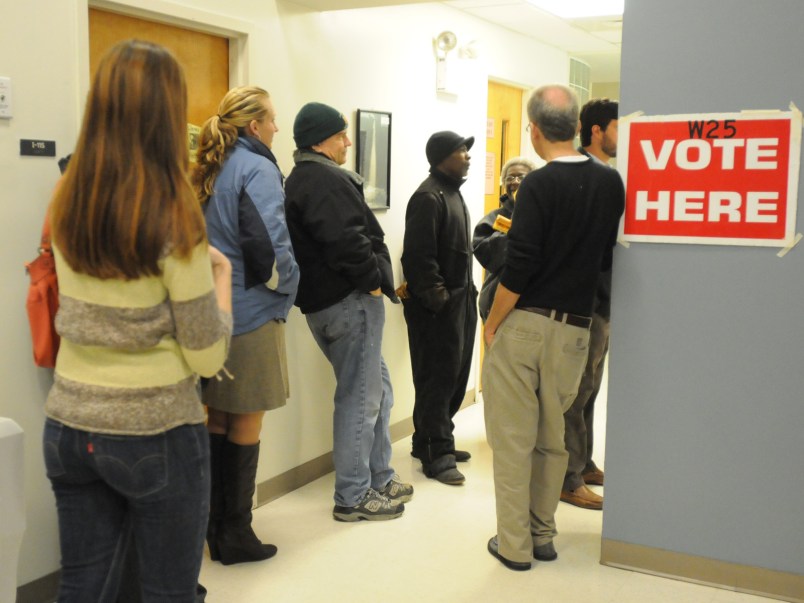RALEIGH, N.C. (AP) — Parts of North Carolina’s new voting law, considered one of the toughest in the nation, were set aside for next month’s elections because they were likely to disenfranchise black voters, a federal appeals court panel ruled Wednesday.
In a 2-1 ruling, the 4th U.S. Circuit Court of Appeals suspended provisions of the Republican-backed law that would have eliminated same-day registration during early voting and voided ballots cast on Nov. 4 outside of a person’s assigned precinct.
“Whether the number is 30 or 30,000, surely some North Carolina minority voters will be disproportionately adversely affected in the upcoming election,” wrote Judge James Wynn, a former North Carolina Supreme Court justice and an African-American. “Once the election occurs, there can be no do-over and no redress. The injury to these voters is real and completely irreparable if nothing is done to enjoin this law.”
Civil rights groups and the U.S. Justice Department challenged the law in North Carolina, which has one of the nation’s most closely watched U.S. Senate races that could determine whether Democrats retain control of the chamber.
State House Speaker Thom Tillis, the Republican challenging incumbent Democratic U.S. Sen. Kay Hagan, said he and state Senate leader Phil Berger, also a Republican, would appeal the ruling to the U.S. Supreme Court.
The GOP has long listed North Carolina as a top target to help win back control of the Senate.
The American Civil Liberties Union, one of the groups challenging the law, said about 250,000 voters took advantage of rules allowing people to register and vote in one trip to an early voting site during each of the last two non-presidential election years.
“The court took an important step to ensure that this election will remain free, fair, and accessible to all North Carolina voters,” said Rev. William Barber II, president of the North Carolina branch of the NAACP.
Judge Diana Gribbon Motz dissented, saying it’s too close to Election Day to force North Carolina to change its planned procedures.
Absentee ballots were mailed Sept. 5, attorneys defending the law said during arguments at a special hearing in Charlotte on Sept. 25.
“We are concerned that changes so close to the election may contribute to voter confusion,” state elections board executive director Kim Westbrook Strach said. “More than 4 million voter guides have gone to the public with information contrary to today’s decision.”
Motz was appointed by a former President Bill Clinton appointee. Judge Henry F. Floyd agreed with Wynn. Both were appointed by President Barack Obama.
“Our decision today acts as a safety net for voters confused about the effect of (the state law) on their right to vote while this litigation proceeds,” Wynn said.
A hearing is scheduled for next year on whether all or part of the law, including requiring voters to show identification starting in 2016, violates provisions of the U.S. Voting Rights Act and the U.S. Constitution.
___
Emery Dalesio can be reached at twitter.com/emerydalesio
___
Follow Associated Press writer Michael Biesecker at Twitter.com/mbieseck
Copyright 2014 The Associated Press. All rights reserved. This material may not be published, broadcast, rewritten or redistributed.







“Whether the number is 30 or 30,000, surely some North Carolina minority voters will be disproportionately adversely affected in the upcoming election.”
“Once the election occurs, there can be no do-over and no redress. The injury to these voters is real and completely irreparable if nothing is done to enjoin this law.”
Odes directly to the SCOTUS. Take this one and the many that will follow.
Hopefully the SCOTUS wont stick their foot in this one like OH
But, but adversely affecting minorities is the whole point. Might as well scrap the whole law, eh?